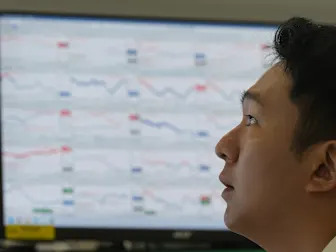Asian shares were mixed on Wednesday after President Donald Trump decided to delay a 50% tariff on goods coming from the European Union, sparking a rally on Wall Street.
U.S. futures were little changed and oil prices rose.
Japan's Nikkei 225 index edged 0.1% higher to 37,757.34.
A closely watched auction of 40-year Japanese government bonds worth about 500 billion yen ($3.5 billion) drew weak demand as worries mount over growing levels of debt. Government debt and bonds have become an increasingly important issue for markets in recent weeks as yields have climbed around the world.
Wednesday’s auction drew a bid to cover ratio of just 2.21, the lowest level since July 2024. When demand is slack, bond prices fall and yields rise. After years of pumping money into the economy through hefty bond purchases, Japan's central bank has been gradually cutting back, undermining demand.
A recent auction of 20-year JGBs also found relatively few buyers. But analysts said worries eased a bit after Japan’s Finance Ministry recently sent a questionnaire to bond investors that they took as a signal of efforts to calm the market by suggesting it might issue less debt.
When yields softened earlier in the week in Japan, the bond market rallied, Thomas Matthews of Capital Economics said in a report. And the “somewhat soft 40-year JGB auction seems to have contributed to a slight souring of the global mood,” he said.
The dollar rose against the Japanese yen, trading at 144.58 yen, up from 144.36 yen. The euro fell to $1.1298 from $1.1329.
Elsewhere in the region, Hong Kong's Hang Seng index lost 0.6% to 23,240.59, while the Shanghai Composite index edged 0.1% higher to 3,343.00.
Australia's S&P/ASX 200 gained shed 0.2% to 8,394.50. The S&P/NZX 50 in New Zealand fell 1.8% after the central bank cut its benchmark interest rate by 0.25 percentage points, to 3.25%.
In South Korea, the Kospi jumped 1.4% to 2,685.44, helped by a global rally in technology shares. Samsung Electronics' shares climbed 3.5% while SK Hynix was up 2.7%.
In Taiwan, the Taiex added 0.1%.
Oil prices rose after the U.S. authorization to Chevron to export crude from Venezuela expired Tuesday. The Trump Administration has been trying to wind down U.S. reliance on Venezuelan energy.
U.S. benchmark crude oil gained 36 cents to $61.25 per barrel. Brent crude, the international standard, was up 35 cents at $63.92 per barrel.
On Tuesday, Wall Street’s roller-coaster ride created by Trump’s trade policies resumed following the delay for his tariffs on the European Union . U.S. markets had been closed for Memorial Day on Monday, and the S&P 500 leaped 2.1% in its first trading since Trump's announcement.
The Dow Jones Industrial Average added 1.8% and the Nasdaq composite gained 2.5%.
Talks with the EU have raised hopes the United States can reach a deal with one of its largest trading partners, helping to keep global commerce moving and avoiding a possible recession. Trump declared a similar pause on his stiff tariffs for products coming from China earlier this month, which launched an even bigger rally on Wall Street at the time.
Surveys have shown U.S. consumers are concerned over the economy’s prospects and where inflation may be heading because of tariffs.
However, a report Tuesday by the Conference Board said confidence among U.S. consumers has improved more in May than economists expected.
It was the first increase in six months, and consumers’ expectations for income, business and the job market in the short term jumped sharply. About half the survey results came after Trump paused some of his tariffs on China.
On Wall Street, Nvidia rallied 3.2% and was the strongest single force driving the S&P 500 higher ahead of its profit report coming on Wednesday. It’s the last to report this quarter among the “Magnificent Seven” Big Tech companies.
Treasury yields eased to take some of the pressure off the stock market. The yield on the 10-year Treasury fell to 4.48% early Wednesday from 4.51% late Friday. It had been rising last week, in part because of worries about the U.S. government’s rapidly increasing debt .


